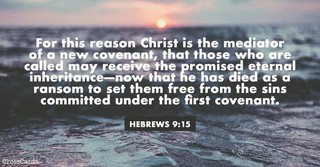
- Recent Translations
- All Translations
Hebrews 9
Share
Settings
Hebrews 9 Commentary
Chapter 9
The Jewish tabernacle and its utensils. (1-5) Their use and meaning. (6-10) These fulfilled in Christ. (11-22) The necessity, superior dignity, and power of his priesthood and sacrifice. (23-28)
Verses 1-5 The apostle shows to the Hebrews the typical reference of their ceremonies to Christ. The tabernacle was a movable temple, shadowing forth the unsettled state of the church upon earth, and the human nature of the Lord Jesus Christ, in whom the fulness of the Godhead dwelt bodily. The typical meaning of these things has been shown in former remarks, and the ordinances and articles of the Mosaic covenant point out Christ as our Light, and as the Bread of life to our souls; and remind us of his Divine Person, his holy priesthood, perfect righteousness, and all-prevailing intercession. Thus was the Lord Jesus Christ, all and in all, from the beginning. And as interpreted by the gospel, these things are a glorious representation of the wisdom of God, and confirm faith in Him who was prefigured by them.
Verses 6-10 The apostle goes on to speak of the Old Testament services. Christ, having undertaken to be our High Priest, could not enter into heaven till he had shed his blood for us; and none of us can enter, either into God's gracious presence here, or his glorious presence hereafter, but by the blood of Jesus. Sins are errors, great errors, both in judgment and practice; and who can understand all his errors? They leave guilt upon the conscience, not to be washed away but by the blood of Christ. We must plead this blood on earth, while he is pleading it for us in heaven. A few believers, under the Divine teaching, saw something of the way of access to God, of communion with him, and of admission into heaven through the promised Redeemer, but the Israelites in general looked no further than the outward forms. These could not take away the defilement or dominion of sin. They could neither discharge the debts, nor resolve the doubts, of him who did the service. Gospel times are, and should be, times of reformation, of clearer light as to all things needful to be known, and of greater love, causing us to bear ill-will to none, but good-will to all. We have greater freedom, both of spirit and speech, in the gospel, and greater obligations to a more holy living.
Verses 11-14 All good things past, present, and to come, were and are founded upon the priestly office of Christ, and come to us from thence. Our High Priest entered into heaven once for all, and has obtained eternal redemption. The Holy Ghost further signified and showed that the Old Testament sacrifices only freed the outward man from ceremonial uncleanness, and fitted him for some outward privileges. What gave such power to the blood of Christ? It was Christ's offering himself without any sinful stain in his nature or life. This cleanses the most guilty conscience from dead, or deadly, works to serve the living God; from sinful works, such as pollute the soul, as dead bodies did the persons of the Jews who touched them; while the grace that seals pardon, new-creates the polluted soul. Nothing more destroys the faith of the gospel, than by any means to weaken the direct power of the blood of Christ. The depth of the mystery of the sacrifice of Christ, we cannot dive into, the height we cannot comprehend. We cannot search out the greatness of it, or the wisdom, the love, the grace that is in it. But in considering the sacrifice of Christ, faith finds life, food, and refreshment.
Verses 15-22 The solemn transactions between God and man, are sometimes called a covenant, here a testament, which is a willing deed of a person, bestowing legacies on such persons as are described, and it only takes effect upon his death. Thus Christ died, not only to obtain the blessings of salvation for us, but to give power to the disposal of them. All, by sin, were become guilty before God, had forfeited every thing that is good; but God, willing to show the greatness of his mercy, proclaimed a covenant of grace. Nothing could be clean to a sinner, not even his religious duties; except as his guilt was done away by the death of a sacrifice, of value sufficient for that end, and unless he continually depended upon it. May we ascribe all real good works to the same all-procuring cause, and offer our spiritual sacrifices as sprinkled with Christ's blood, and so purified from their defilement.
Verses 23-28 It is evident that the sacrifices of Christ are infinitely better than those of the law, which could neither procure pardon for sin, nor impart power against it. Sin would still have been upon us, and have had dominion over us; but Jesus Christ, by one sacrifice, has destroyed the works of the devil, that believers may be made righteous, holy, and happy. As no wisdom, learning, virtue, wealth, or power, can keep one of the human race from death, so nothing can deliver a sinner from being condemned at the day of judgment, except the atoning sacrifice of Christ; nor will one be saved from eternal punishment who despises or neglects this great salvation. The believer knows that his Redeemer liveth, and that he shall see him. Here is the faith and patience of the church, of all sincere believers. Hence is their continual prayer as the fruit and expression of their faith, Even so come, Lord Jesus.
Hebrews 9 Commentaries
Chapter Summary
INTRODUCTION TO HEBREWS 9
The apostle having, in the former chapter, taken notice of the first covenant, in this proceeds to show what belonged to it, that it had service performed under it, and a place in which it was performed, Heb 9:1 and he begins with the latter, which he distinguishes into two parts, and shows what was in each of them; in the first, which was the holy place, were a candlestick, table, and shewbread; in the second, which was the holiest of all, were a golden censer, the ark of the covenant, the golden pot of manna, Aaron's rod, the tables of the covenant, and the cherubim of glory overshadowing the mercy seat, Heb 9:2-5. And next he speaks of the service performed in these places; in the first, the holy place, the common priests entered every day, doing service, as offering sacrifice Heb 9:6 and in the second, the holy of holies, only the high priest entered into, and that but once a year, with blood of slain beasts, which he offered for his own sins, and the sins of the people, Heb 9:7 and this being shut up, and entered into but once a year, was an indication from the Holy Ghost, that the way into the holiest of all, which this was then a figure of, was not yet made manifest, while the tabernacle or temple was standing, in which sacrifices were offered, which could not perfect the offerer of them, or remove guilt from his conscience, Heb 9:8,9 which shows the imperfection of that priesthood, it consisting of meats, drinks, baptisms, and carnal ordinances imposed on the Jewish nation until the times of the Messiah, Heb 9:10 which are now come, and in which there is an accomplishment of all those types and figures; Christ was typified by the high priest; and he is come as such, and the good things, the law was a shadow of, are come by him; who came into the world by the assumption of human nature, a more perfect tabernacle than the type of it was; and now having obtained eternal redemption for his people, he is gone into heaven, the most holy place, not as the high priest, with the blood of slain beasts, but with his own blood, Heb 9:11,12 the efficacy of which blood is argued from the lesser to the greater, that if the blood of beasts, and water of separation, sanctified and purified externally, then much more must the blood of Christ purge the conscience from sin, that it may serve God, since Christ offered himself to God without spot, through the eternal Spirit, Heb 9:13,14. The necessity of Christ's shedding his blood, or of his death, is proved from his being the Mediator of the new covenant, which required the redemption of transgressions under the first testament, that called ones might have the promise of the eternal inheritance, Heb 9:15. And this is reasoned from the nature of testaments or wills among men, which make the death of the testator necessary, they being of no force while he lives, only after his death, Heb 9:16,17. And this is further illustrated by the first testament being dedicated by blood, and everything belonging to it purged by it, the book, the people, the tabernacle, and all the vessels of it; nor is there any remission of sin, whether typical or real, without shedding of blood, Heb 9:18-22 wherefore, as it was necessary that the patterns and types of heavenly things should be purified in this manner; it must be more so, that the antitypes should be purified with better sacrifices, even with the sacrifice of Christ, Heb 9:23 and accordingly Christ is entered into heaven itself, of which the holy places in the tabernacle were figures, there to present and plead his sacrifice on account of his people, Heb 9:24 not that it was necessary that he should offer up himself again, or often, as the high priest, his type, went every year into the holy place with the blood of others; for then he must have often suffered since the world began, of which there was no need, since his appearing once in the end of the world, to put away sin by the sacrifice of himself, is sufficient, Heb 9:25,26 for as it is the appointment of God, that men should die but once, and then come to judgment, so it was only necessary that Christ should be offered once to bear the sins of all his people, and then appear a second time without any sin at all upon him, to the salvation of those that look for him, Heb 9:27,28.
